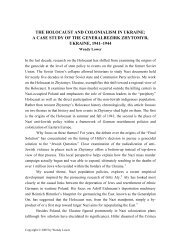Effects of Teachers' Mathematical Knowledge for Teaching on - Apple
Effects of Teachers' Mathematical Knowledge for Teaching on - Apple
Effects of Teachers' Mathematical Knowledge for Teaching on - Apple
You also want an ePaper? Increase the reach of your titles
YUMPU automatically turns print PDFs into web optimized ePapers that Google loves.
Hill, Rowan, & Ball<br />
ular, their classroom explanati<strong>on</strong>s, representati<strong>on</strong>s, and interacti<strong>on</strong>s with students’<br />
mathematical thinking—might affect student outcomes. Our results<br />
also in<str<strong>on</strong>g>for</str<strong>on</strong>g>m findings from the educati<strong>on</strong>al producti<strong>on</strong> functi<strong>on</strong> literature by<br />
indicating that a direct measure <str<strong>on</strong>g>of</str<strong>on</strong>g> teachers’ c<strong>on</strong>tent knowledge <str<strong>on</strong>g>for</str<strong>on</strong>g> teaching<br />
trumps proxy measures such as courses taken or experience and by suggesting<br />
that measures <str<strong>on</strong>g>of</str<strong>on</strong>g> teacher knowledge should be at least c<strong>on</strong>tent specific<br />
or, even better, specific to the knowledge used in teaching children.<br />
Our findings both support and challenge recent policy initiatives. If<br />
successful, ef<str<strong>on</strong>g>for</str<strong>on</strong>g>ts to improve teachers’ mathematical knowledge through<br />
c<strong>on</strong>tent-focused pr<str<strong>on</strong>g>of</str<strong>on</strong>g>essi<strong>on</strong>al development and preservice programs will<br />
improve student achievement, as intended. Such programs include Cali<str<strong>on</strong>g>for</str<strong>on</strong>g>nia’s<br />
Mathematics Pr<str<strong>on</strong>g>of</str<strong>on</strong>g>essi<strong>on</strong>al Development Institutes, the Nati<strong>on</strong>al Science<br />
Foundati<strong>on</strong>/U.S. Department <str<strong>on</strong>g>of</str<strong>on</strong>g> Educati<strong>on</strong>’s Math-Science Partnerships, and<br />
many other local ef<str<strong>on</strong>g>for</str<strong>on</strong>g>ts throughout the United States. Yet, our results suggest<br />
that those who may benefit most are teachers in the lowest third <str<strong>on</strong>g>of</str<strong>on</strong>g> the<br />
distributi<strong>on</strong> <str<strong>on</strong>g>of</str<strong>on</strong>g> knowledge and that ef<str<strong>on</strong>g>for</str<strong>on</strong>g>ts to recruit teachers into pr<str<strong>on</strong>g>of</str<strong>on</strong>g>essi<strong>on</strong>al<br />
development and preservice coursework might focus most heavily<br />
<strong>on</strong> those with weak subject-matter knowledge <str<strong>on</strong>g>for</str<strong>on</strong>g> teaching. However,<br />
without ways to differentiate and select such teachers, and without str<strong>on</strong>g<br />
incentives <str<strong>on</strong>g>for</str<strong>on</strong>g> bringing these teachers into c<strong>on</strong>tent-focused pr<str<strong>on</strong>g>of</str<strong>on</strong>g>essi<strong>on</strong>al<br />
development, the intended effects <str<strong>on</strong>g>of</str<strong>on</strong>g> these programs may be lost. Moreover,<br />
without c<strong>on</strong>ceptual and analytic tools <str<strong>on</strong>g>for</str<strong>on</strong>g> examining whether and what<br />
teachers learn from such pr<str<strong>on</strong>g>of</str<strong>on</strong>g>essi<strong>on</strong>al development, ef<str<strong>on</strong>g>for</str<strong>on</strong>g>ts to develop the<br />
quality and effectiveness <str<strong>on</strong>g>of</str<strong>on</strong>g> programs designed to improve teaching will be<br />
impeded.<br />
Another key questi<strong>on</strong> generated by our results c<strong>on</strong>cerns equity, namely<br />
the intellectual resources available to students across race and SES (see Cohen,<br />
Raudenbush, & Ball, 2003, <str<strong>on</strong>g>for</str<strong>on</strong>g> a discussi<strong>on</strong> <str<strong>on</strong>g>of</str<strong>on</strong>g> such resources). In the first<br />
grade, teachers’ mathematical knowledge <str<strong>on</strong>g>for</str<strong>on</strong>g> teaching in this data set was distributed<br />
fairly evenly across students at different SES levels, but there was a<br />
negative relati<strong>on</strong>ship between student minority status (r =−.16, p < .01) and<br />
teachers’ mathematical knowledge <str<strong>on</strong>g>for</str<strong>on</strong>g> teaching. In the third grade, the relati<strong>on</strong>ship<br />
between student SES and teacher knowledge was significant (r = .11,<br />
p < .05) in this data set, and the relati<strong>on</strong>ship between minority status and<br />
teacher knowledge increased in comparis<strong>on</strong> with first grade (r =−.26, p <<br />
.0001). These results are similar to those observed elsewhere with other samples<br />
<str<strong>on</strong>g>of</str<strong>on</strong>g> schools and teachers (Hill & Lubienksi, 2005; Loeb & Reininger, 2004).<br />
This problem <str<strong>on</strong>g>of</str<strong>on</strong>g> inequitable distributi<strong>on</strong> <str<strong>on</strong>g>of</str<strong>on</strong>g> teaching knowledge across different<br />
socioec<strong>on</strong>omic and ethnic groups is particularly pressing if the relati<strong>on</strong>ship<br />
<str<strong>on</strong>g>of</str<strong>on</strong>g> teachers’ mathematical knowledge to instructi<strong>on</strong>al quality is n<strong>on</strong>linear,<br />
as our analyses suggest. A porti<strong>on</strong> <str<strong>on</strong>g>of</str<strong>on</strong>g> the achievement gap <strong>on</strong> the Nati<strong>on</strong>al<br />
Assessment <str<strong>on</strong>g>of</str<strong>on</strong>g> Educati<strong>on</strong>al Progress and other standardized assessments might<br />
result from teachers with less mathematical knowledge teaching more disadvantaged<br />
students. One strategy toward closing this gap, then, could be investing<br />
in the quality <str<strong>on</strong>g>of</str<strong>on</strong>g> mathematics c<strong>on</strong>tent knowledge am<strong>on</strong>g teachers working<br />
400




